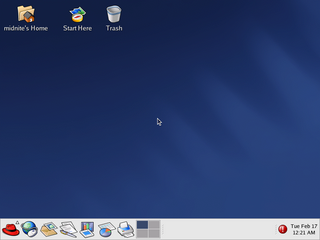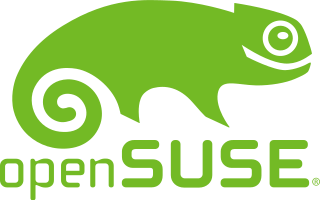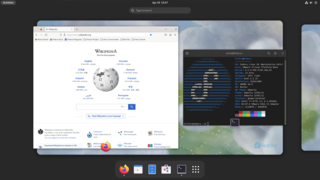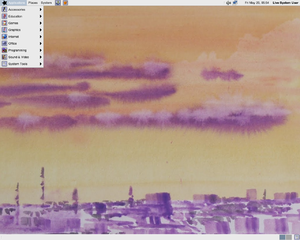
A Linux distribution is an operating system made from a software collection that includes the Linux kernel, and often a package management system. Linux users usually obtain their operating system by downloading one of the Linux distributions, which are available for a wide variety of systems ranging from embedded devices and personal computers to powerful supercomputers.

Red Hat Linux was a widely used commercial open-source Linux distribution created by Red Hat until its discontinuation in 2004.

The GNU Project is a free software, mass collaboration project announced by Richard Stallman on September 27, 1983. Its goal is to give computer users freedom and control in their use of their computers and computing devices by collaboratively developing and publishing software that gives everyone the rights to freely run the software, copy and distribute it, study it, and modify it. GNU software grants these rights in its license.
Technical variations of Linux distributions include support for different hardware devices and systems or software package configurations. Organizational differences may be motivated by historical reasons. Other criteria include security, including how quickly security upgrades are available; ease of package management; and number of packages available.

openSUSE is a free and open source RPM-based Linux distribution developed by the openSUSE project.

Musix GNU+Linux is a discontinued live CD and DVD Linux distribution for the IA-32 processor family based on Debian. It contained a collection of software for audio production, graphic design, video editing and general purpose applications. The initiator and co-director of the project was Marcos Germán Guglielmetti.

Korora was a remix of the Fedora Linux distribution. Originally Kororaa was a binary installation method for Gentoo Linux which aimed for easy installation of a Gentoo system by using install scripts instead of manual configuration. The name derives from the Māori word kororā – the little penguin.

gNewSense was a Linux distribution, active from 2006 to 2016. It was based on Debian, and developed with sponsorship from the Free Software Foundation. Its goal was user-friendliness, but with all proprietary and non-free software removed. The Free Software Foundation considered gNewSense to be composed entirely of free software.
GNU variants are operating systems based upon the GNU operating system. According to the GNU project and others, these also include most operating systems using the Linux kernel and a few others using BSD-based kernels.

Fedora Linux is a Linux distribution developed by the Fedora Project. It was originally developed as a continuation of the Red Hat Linux project and it contains software distributed under various free and open-source licenses and aims to be on the leading edge of open-source technologies. It is now the upstream source for Red Hat Enterprise Linux.

Linux-libre is a modified version of the Linux kernel that contains no binary blobs, obfuscated code, or code released under proprietary licenses. In the Linux kernel, they are mostly used for proprietary firmware images. While generally redistributable, binary blobs do not give the user the freedom to audit, modify, or, consequently, redistribute their modified versions. The GNU Project keeps Linux-libre in synchronization with the mainline Linux kernel.
Canaima GNU/Linux is a free and open-source Linux distribution that is based on the architecture of Debian. It was created as a solution to cover the needs of the Venezuelan Government as a response to presidential decree 3,390 that prioritizes the use of free and open source technologies in the public administration. On 14 March 2011, Canaima was officially established as the default operating system for the Venezuelan public administration.

Hanthana Linux is a Linux distribution based on Fedora, distributed as free and open source software.
Fedora Linux is a popular Linux distribution developed by the Fedora Project. Fedora attempts to maintain a six-month release schedule, offering new versions in May and November, although some releases have experienced minor delays.

Linspire is a commercial operating system based on Debian and Ubuntu and currently owned by PC/OpenSystems LLC. It had been owned by Linspire. Inc. from 2001 to 2008, and then by Xandros from 2008 to 2017.

paldo is a Linux distribution. It was originally developed by Jürg Billeter and Raffaele Sandrini and released in 2004, mainly under the GNU GPL.

The Trinity Desktop Environment (TDE) is a complete software desktop environment designed for Linux and Unix-like operating systems, intended for computer users preferring a traditional desktop model, and is free/libre software. Born as a fork of KDE 3.5 back in 2010, it was originally created by Timothy Pearson, who had coordinated Kubuntu remixes featuring KDE 3.5 after Kubuntu switched to KDE Plasma 4.

Void Linux is an independent Linux distribution that uses the X Binary Package System (XBPS) package manager, which was designed and implemented from scratch, and the runit init system. Excluding binary kernel blobs, a base install is composed entirely of free software.

Uruk GNU/Linux-libre is a PureOS-based Linux distribution. The name Uruk is an Iraqi city that states its Iraqi origin. Uruk GNU/Linux 1.0 was released on 13 April 2016 and it ships with the most common software for popular tasks.
















